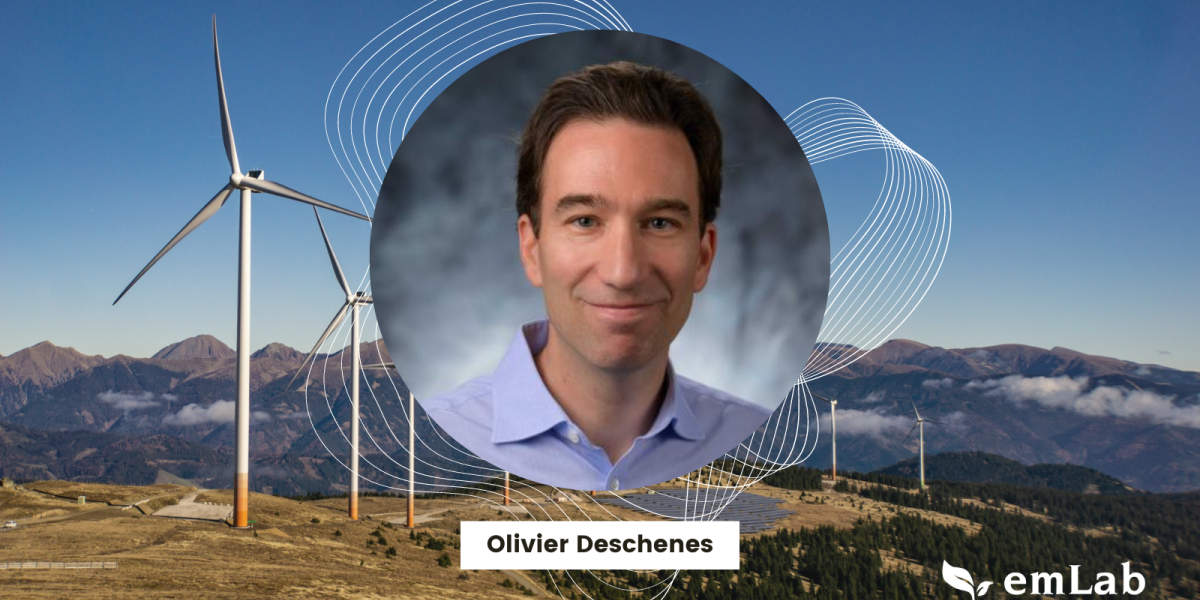
Describe your role at emLab.
I am a Research Associate in the Climate & Energy program.
Where did you grow up? Does it influence what you do now?
I grew up in a town called Sorel-Tracy in Quebec, Canada. It’s about 50 miles from Montreal, which is Quebec’s biggest city. It’s a small town with 30,000 people and when I was growing up it was a very industrial town with big steel plants and shipbuilding yards. This influenced what I work on today because both of my parents worked in those big industries and at different points they were leaders at a union. So, I’ve always had an interest in working conditions and trying to improve wages for blue-collar workers. Also, I grew up surrounded by heavy pollution from smoke stacks so I’ve wanted to work on environmental problems as a result.
Were there any fields of study you were interested in before you chose economics?
When I was in college, I started with economics and stayed in economics. It was either economics or bust because it was something that I wanted to do.
Give me a one-word description of how you work.
“Following my intuition.” I want to follow my own path when answering questions. Something I prioritize is trying to do something new and original.
What keeps you curious about your work at emLab?
I’m an empirical researcher so I work with data, and what keeps me interested is finding new data and new research questions to answer. I love to document new empirical patterns. One thing that’s great with emLab is that it provides me with opportunities to work in new areas and with new sources of data.
What research question/topic are you most excited to tackle next?
I’m interested in climate change adaptation, its costs and its benefits, in addition to the economic and health implications of energy production and consumption. I am also working on how wildfires impact health and we have new data on this topic, which is really exciting.
What do you think makes emLab unique?
What makes emLab unique is the people that it comprises. Of course we are all interested in solving environmental problems within our individual fields and areas, but the people also bring in different personalities and perspectives. The diversity of background, ideas, and methods in emLab is what allows us to find new solutions to today’s problems.
What is your vision for emLab over the next 5 years?
emLab and myself are very lucky because the Climate & Energy program, with Kyle Meng, Tamma Carleton, and Ranjit Deshmukh is pretty much the Dream Team. I am thrilled to work with these outstanding colleagues. I hope we can find ways to collaborate more both for academic papers and for applied projects.
Rapid Fire Questions
If you could be any animal, what would it be and why?
A bear. They're the strongest animal in the wild and I like the idea of hibernation.
What are 5 things you couldn’t live without?
The first would be my family (my wife and daughter) because they played such a vital role in my life. The second would be musical instruments because I play a lot of music. To me instruments are like art pieces – I just like to look at them even if I don’t play them. I hate to say it but third is a computer because I like work, so I need my computer to work and to communicate with others. The fourth would be things involved with food and cooking because I love food and cooking, so anything that’s related to that like wine. The fifth would be a good pair of shoes because I love to exercise and explore new places.
What is one song to describe this season of your life?
I listen to a lot of music, but not “songs” because I mostly listen to instrumental and classical music. I really like piano, like jazz music or more classical like Chopin. One of my favorite pianists, Brad Mehldau, mostly plays jazz music but also composes contemporary music. Early on in the lockdown, he composed an album called “Suite: April 2020” that reflected a lot of the emotions of living during the Pandemic. I also love his “10 Years Solo Live” set.
What could you present for 40-minutes with absolutely no preparation?
I am very interested in wine and I actually have a winery here in Santa Barbara (with other emLab PIs as some readers might know), so I can give a spiel about wine or winemaking with no problem. I know a lot about the Canadian national sport, hockey, which I can talk about with anybody for a very long time.
If you could go to the past or the future as an observer, which would you choose and why?
It would be the future, simply because if someone wanted to know about the past you can find books or documents that will give you information about the past. However, for the future, we have science fiction but we don’t know anything real about it.
What is one of the most inspiring places you have been and why?
Looking at the ocean will always be inspiring to me. There is something about a very large body of water that is fascinating and interesting. If it’s a place I’ve been to, it would be Paris because I love the buildings. Also, because of their food and wine.
What advice do you wish you received early in your career?
I received a lot of good advice but I think the best advice was to go slower and take your time and enjoy the process. Another is also to be more open-minded and collaborative because you can produce better research and there is value in working together.


